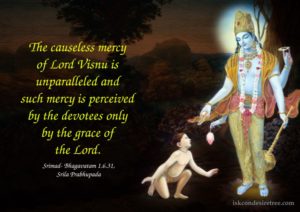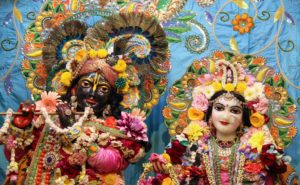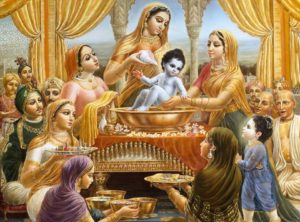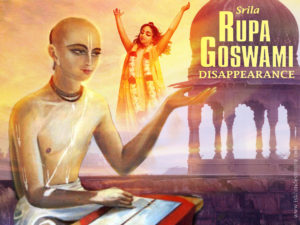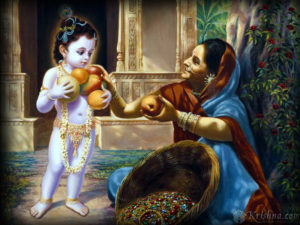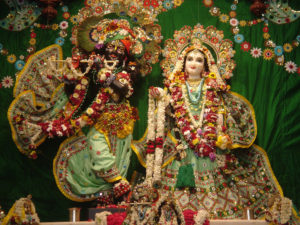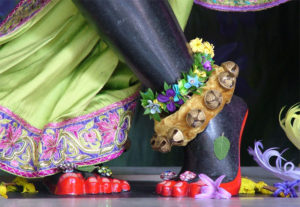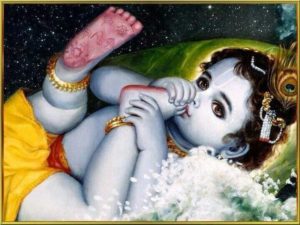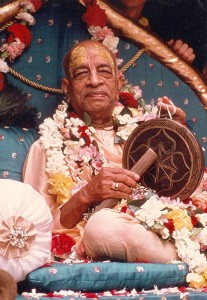Hare Krishna.
12th July, 2016. Gurgaon.

sri-guru-carana-padma, kevala-bhakati-sadma,
bando mui savadhana mate
jahara prasade bhai, e bhava toriya jai,
krsna-prapti hoy jaha ha’te
The lotus feet of our spiritual master are the only way by which we can attain pure devotional service. I bow to his lotus feet with great awe and reverence. By his grace one can cross the ocean of material suffering and obtain the mercy of Krsna.
( Guru Puja, from Prema-bhakti-candrika, by Srila Narottama Dasa Thakura)
In one of my previous blog on Lotus feet of Krishna I had written that, Gaura willing, I will try to write another blog on Lotus feet of Guru. As I was looking for various scriptures for this topic I found a transcendental lecture given by Srila Gour Govinda Swami maharaja, simply divine. I am copying some parts from Maharaj’s lecture below.
Lotus feet of Guru
In this world, Sri Guru is the only beauty or asset, wealth. There is nothing else. Carana means feet. Sri-guru-carana-padma the feet of Sri Guru are compared to the lotus. This is also very significant. Why are his feet compared to the lotus and not to anything else? The lotus flower looks very nice and beautiful, and it also provides very sweet honey, madhu. The bumblebee collects honey from different flowers, but especially from the lotus flower. So what sort of special quality is there in the honey collected from the lotus flower that is not present in the honey collected from other flowers? It is a special type of honey known as padma-madhu. The disciple who is like a bumblebee, who is very hungry and greedy for that honey, relishes it.
This lotus grows in Bhakti-rasa
Although the lotus flower grows out of the water, it is not touched by it. One of the synonyms for water is rasa, mellow. The feet of Sri Guru are compared to a lotus, but this lotus grows in the transcendental water of bhakti-rasa, the mellow of bhakti. Such are the lotus feet of Sri Guru. His lotus feet are aprakrta, not material, but transcendental. They are bhakati-sadma, the abode of transcendental bhakti-rasa as well as all madhuri, beauty. The lotus looks beautiful to the eye and is very attractive to the heart.

Similarly, the shining lotus feet of Sri Guru are very beautiful in the eyes of the disciple and very attractive to his heart. All of the activities, form, qualities, and pastimes of Sri Guru are very beautiful in the eyes of the sadhaka-bhakta. Through the eye of meditation the sadhaka-bhakta sees the beautiful lotus feet of Sri Guru. Upon seeing those lotus feet he feels a soothing effect in his afflicted heart. His heart is afflicted with the three tapas, sufferings: adhyatmika, sufferings arising from one’s own mind and body; adhidaivika, sufferings arising from nature; and adhibhautika, sufferings arising from other living entities. When the disciple meditates on the beautiful lotus feet of Sri Guru he feels a soothing effect and his affliction is cooled down. At the same time he also smells the nice scent that is coming from the lotus feet of Sri Guru, like the scent that comes from the lotus.
Cooling shade of Lotus feet
The bumblebee wanders everywhere, going to various types of flowers. One type of flower is the ketaki flower. That flower is found in India, but not in the West. The tree on which the ketaki flower grows, like the rose plant, has thousands of thorns. The ketaki flower has a nice scent, and a bumblebee that becomes attracted by the scent from the ketaki flower goes there. But because of the many thorns on the tree his wings become torn and he feels so much pain and affliction.
The bumblebee thinks, “Where to go now? Can I get shelter in a place where there is no pain and affliction? Where can I get peace?” After wandering hither and thither, at last he comes to the lotus flower and experiences the cooling, soothing effect there. He takes shelter inside the lotus flower, sucks the sweet honey there, and thus gets nourishment.
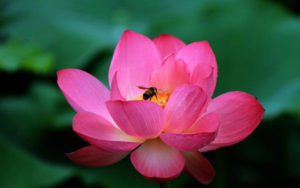
Similarly, the jiva who is wandering and wandering through the innumerable universes and through the innumerable species of life of this material world brahmanda bhramite kona bhagyavan jiva gets only more and more suffering, misery, and torture. There is no cooling effect in the material world, which is like a blazing forest fire samsara-davanala.
Nobody starts the forest fire, but automatically by the rubbing of two pieces of wood, the whole forest is burned and the animals that live in the forest are burned to ashes. They feel the burning heat, which is very painful. Similarly, the conditioned souls in this material world feel the burning sensation coming from the three tapas: adhyatmika, adhibhautika, and adhidaivika. After wandering through innumerable universes and innumerable species of life, at last the fortunate soul, bhagyavan jiva, comes to the lotus feet of Sri Guru and takes shelter in the cooling shade there. As the bumblebee sucks honey from the lotus flower, similarly, the guru-padma, the lotus feet of Sri Guru, allow that jiva, who is compared to the bumblebee, to suck the nice honey whereby he gets real nourishment and also premananda, loving happiness.
A Special Type of Honey
Padma-madhu, the honey collected from the lotus flower, is a special type of honey. The Ayurveda-sastra says that it is a good medicine for the eye. If someone has some eye disease due to impurities in the eye the kaviraj, ayurvedic doctor, will advise him to rub some padma-madhu in his eyes. Because of these impurities one cannot see clearly and feels pain. Applying some padma-madhu on the eyes will clean out all the impurities and then one will be able to see clearly. Similarly, the guru-padma-madhu, the honey emanating from the lotus feet of Sri Guru, is so sweet and nectarean that if a fortunate disciple gets it and relishes it then the disciple’s eyes will be cleansed of the material conception.
This honey flows from Lotus feet of Guru
om ajnana-timirandhasya
jnananjana-salakaya
caksur unmilitam yena
tasmai sri-gurave namah
I was born in the dense darkness of ignorance, blind, without real vision. Sri Guru, by his causeless mercy, has opened my eyes with the torchlight of knowledge.
For a person who has some painful eye disease, who cannot see well, the kaviraj will advise him to apply some padma-madhu by which the drsti-sakti, the power to see clearly, will develop. Then not only will he get nice eyesight but also he will be able to see even very subtle things that he would otherwise never have been able to see. Similarly, when one takes shelter at the lotus feet of Sri Guru and gets the guru’s mercy, the guru allows the surrendered disciple to taste that sweet honey emanating from the guru’s lotus feet. That is the medicine whereby his material eyes will be cleansed of all material contamination. He develops transcendental vision.
He may have been blinded by the dense darkness of ignorance, ajnana-andhakara, but that will all be gone now. The darkness is dispelled and he receives the eyes of knowledge divya-jnana-caksu. Sri Guru imparts tattva-jnana, and by his mercy the disciple develops transcendental vision. With that vision he will be able to see the beautiful form of the Supreme Lord, Syamasundar. This is the honey, or madhu, emanating from the lotus feet of Sri Guru; it acts in such a wonderful way. Therefore the phrase, “sri-guru-carana-padma” is very significant the lotus feet of Sri Guru are compared to a lotus. Why is this comparison made and how to explain it?
Padma-madhu
Padma-madhu cures eye disease and clears out all the impurities from the eye, but it cannot clear the impurities from the heart. However, the honey emanating from the lotus feet of Sri Guru, guru-padma-madhu, has such a special and wonderful characteristic that it cures both the eye and the heart. Sri-guru-carana-padma-madhu cleanses and purifies the heart so that it will become a suitable place for Govinda, Krishna, to reside.
tomara hrdoye sada govinda-visram
govinda kohena mora vaisnava paran
Narottam Das Thakur sings, “O Vaisnava-thakura! Govinda, Krishna, resides in your heart, which is like Vrindavan, the eternal abode of Govinda. He stays there very blissfully and peacefully. He never leaves your heart.”
The guru makes the heart of his surrendered disciple a suitable place for Krishna to reside. Because the guru gives the disciple shelter at his lotus feet and allows him to suck that special type of honey that has that wonderful characteristic, the heart of the surrendered disciple is cleansed.
Not just any honey!
The conditioned souls are like a diseased person suffering from various kinds of material ills bhava-rogi. Their disease is very chronic. They have already taken many medicines allopathic, homeopathic, and Ayurvedic but the disease is still not cured. The disease is incurable and has become chronic. They have already lost their vitality, jivana-sakti, and cannot digest any food. They have taken so many medicines, and that has also produced a bad effect.
These days you will find so many strong drugs, but what is their effect? They simply result in chronic incurable disease. People lose their vitality, and they cannot even eat anything because their digestive fire is very low. How can they survive? They are dying. They cannot eat or digest anything. The kaviraj will advise, “You should only eat one thing madhu. And especially padma-madhu, the special type of honey from the lotus flower.”
He prescribes padma-madhu, whereby they will regain their vitality. This honey will give them life. Any other type of food cannot be given; only padma-madhu is advised. Then they can regain their vitality. Such jivas, wandering through innumerable universes and experiencing the miseries of innumerable species of life, have become completely hopeless. They are only getting suffering, so many material ills bhava-roga.
If such persons are fortunate, they will come to the lotus feet of Sri Guru. That guru is like a physician, sadhu-vaidya. He knows the perfect and unfailing medicine to cure the material disease, bhava-roga. He knows the cause of the jiva’s suffering. There is only one medicine, the honey emanating from the lotus feet of Sri Guru guru-padma-madhu. So, as the lotus allows the bumblebee whose wings are torn by the thorns of the ketaki flower to take shelter inside the flower, similarly, the guru allows the disciple to take shelter at his lotus feet.
The guru-padma, the lotus feet of Sri Guru, gives such hopeless wandering souls shelter and allows them to suck honey, whereby they regain their vitality. The suffering jiva gets nourishment and life there. That is why we say, “sri-guru-carana-padma.” The lotus feet of Sri Guru are compared to a lotus, and not to anything else. This phrase has great significance.
saksad-dharitvena samasta-sastrair
uktas tatha bhavyata eva sadbhih
kintu prabhor yah priya eva tasya
vande guroh sri-caranaravindam
The spiritual master is honored as much as the Supreme Lord because he is the most confidential servitor of the Lord. This is acknowledged in all revealed scriptures and is followed by all authorities. Therefore I offer my respectful obeisances unto the lotus feet of my spiritual master, who is a bona fide representative of Sri Hari.
(Srila Viswanath Chakravarti Thakur, Gurv-astaka, verse 7 )
Sri Guru is saksad-dharitvena, he is as good as Lord Hari. He does not belong to this material world. He belongs to the spiritual world, Krishna’s world. He comes down here out of his causeless mercy, either voluntarily to deliver the fallen souls or when the Lord sends him. Whether he comes here voluntarily or by the will of the Lord, that guru-padma descends here to shower his mercy on the suffering conditioned souls who have been drowning in the dreadful ocean of materialistic existence since time immemorial. That guru-padma descends and stays here in the material world.
Someone may raise the question, “This material world is illusory, mayika jagat. The three modes of material nature are here, sattva, raja, and tama goodness, passion, and ignorance. If the guru comes and stays in this material world, will he not be affected by those three modes? How can his transcendental nature remain unaffected in this dreadful ocean of material existence? How does he act here?”
This is very easy to understand from the example of the lotus flower. The lotus flower lives in the water, but it is not affected. It remains untouched. Similarly, although Sri Guru comes here to this material world, he remains untouched. He is never affected by the three modes of material nature. Therefore the feet of Sri Guru are compared to a lotus. The bumblebee that comes to the lotus that is in the water and takes shelter inside that lotus is also untouched by the water. Similarly, the fortunate soul who has taken shelter at the lotus feet of Sri Guru will never be afraid of this material world. Just as the bumblebee takes shelter of the lotus and is protected from being touched by the water, so the disciple who takes shelter at the lotus feet of Sri Guru will not be affected by the material nature. This is the lotus feet of Sri Guru.
Beware!
Another point is there. When the sun rises, the lotus blossoms, and when the sun sets the petals of the lotus close. Similarly, the petals of the guru-padma will open when it sees the intense desire and crying in the heart of the suffering soul to go back to Godhead and get Krishna. This crying for bhakti is like the rising of the sun.
When the sun sets, the petals of the lotus close. Similarly, a disciple who has developed an intense and burning desire in his heart has come to the guru and received shelter. But many times we see that later on, that disciple loses his bhakti-vrtti, his devotional engagement. Because of committing some offense like nama-aparadha or vaisnava-aparadha he loses his bhakti-vrtti. His bhakti becomes shrunken and he does not carry out the orders of the guru or hear the guru’s message. He is avoiding or disobeying his guru. When the sun sets, the petals of the lotus close. Similarly, the guru disappears from the vision of that disciple.
(By Srila Gour Govinda Swami)
Kṛṣṇadāsa Kavirāja Gosvāmī prays in CC Antya 20.147, sabāra caraṇa-kṛpā — ‘guru upādhyāyī’, The mercy of their lotus feet is my spiritual master.
I once heard that Srila Bhaktisiddhanta Sarasvati Thakura used to say that lotus feet of his guru are his spiritual master. Similarly in some circles of Gaudiya math there is a still a tradition that when devotee is asked who is your spiritual master, then the reply is that the lotus feet of HH ….. are my spiritual master.
Isn’t this a very gentle and submissive, yet a very personal, way of introducing our spiritual master to a vaishnava, a not so bad idea to practice.

Srila Prabhupada’s lotus feet
Srila Sridhara Swami prays
“O transcendentally blissful guru, when my mind finally achieves a place at your lotus feet, all the tiresome labor of my spiritual practices will be finished, and by your mercy I will experience the greatest happiness.”
(SB 10.87.33p)
All glories to the lotus feet of our Param Guru.
All glories to Sri Guru and Gauranga.
All glories to Srila Prabhupada.
Like this:
Like Loading...

